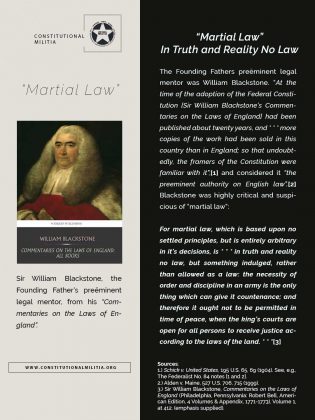Last Updated on February 17, 2022 by Constitutional Militia
THE LAWFUL CHECK AGAINST “MARTIAL LAW” WERE THEN AND REMAIN TODAY “THE MILITIA OF THE SEVERAL STATES”
General Gage’s imposition of “the law martial” left the patriots but one alternative: “We are reduced to *** chusing an unconditional submission to the tyranny of irritated ministers, or resistance by force.—The latter is our choice.” —”The Declaration of Causes and Necessity of Taking Up Arms”, 6 July 1775.
Source: Documents Illustrative of the Formation of the Union of the American States, House Document No. 398, 69th Congress, 1st Session (Washington D.C.: Government Printing Office, 1927), at 15.
“Martial Law” in America’s Founding Era
The first and most important step towards elucidating the true meaning of America’s foundational legal documents is “to review the background and environment of the period in which th[ose documents were] fashioned and adopted”,[1] “to place ourselves as nearly as possible in the condition of” the Americans of that era,[2] and “to recall the contemporary or then recent history of the controversies of the subject” that still “were fresh in the memories of those who achieved our independence and established our form of government”.[3] One must not, however, enter only the individual minds of the Framers of the Declaration, the original Constitution, and the Bill of Rights who drafted them, or the Founding Fathers who worked for their ratification, or others among the most prominent patriots of their time, but instead must search out the most probable consensus among all of the reasonably intelligent and informed Americans of personal integrity who supported independence and whom the Declaration singles out as “the good People of the[ ] Colonies”, whom the original Constitution identifies as WE THE PEOPLE”,[4] and to whom the Bill of Rights repeatedly refers to as “the people”,[5] the question then becomes: “How on the basis of their knowledge and experience would “the good People” in 1776, “WE THE PEOPLE” in 1788, and “the people” in 1791 have determined what the Declaration of Independence, the original Constitution, and then the Bill of Rights would have meant to them with respect to modern-day “martial governance”? To determine that it suffices to understand what those documents would have meant to Americans in that day with respect to the “martial law” with which they had become all to familiar.[6]
“Martial Law” was of concern not just to every American patriot of the Founding Era who was conversant with pre-constitutional Anglo-American law, history, and political philosophy, either. As even America’s Founding Fathers’ preeminent legal mentor William Blackstone himself had observed:
The Founding Patriots preeminent legal mentor, Sir William Blackstone, taught that “martial law *** is built upon no settled principles, but is entirely arbitrary in it’s decisions”, and “is *** in truth and reality no law, but something indulged, rather than allowed as law” [7]
As the Framers of America’s foundational documents were well aware, “To prevent the executive power from being able to oppress, *** it is requisite that the armies with which it is entrusted should consist of the people, and have the same spirit with the people ***. Nothing then, according to these principles, ought to be more guarded against in a free state, than making the military power , when such a one is necessary to be kept on foot, a body to distinct from the people.”[8]
“Martial law” was discountenanced in pre-constitutional Anglo-American legal tradition. When the Founding patriots were placed under “the law martial” by British General Gage the episode triggered the War of Independence. The Constitution subsequently incorporated the Militia structure, then in existence at all times for over 150 years, as the permanent oversight and enforcement of laws by the PEOPLE themselves—properly organized, armed, and trained as State government institutions. Constitutional State Militia are not “revolutionaries” antagonistic to the government, but are permanent State government institutions, thoroughly civilian in character, sanctioned by the original Constitution and reinforced as “necessary” in the Second Amendment.






























